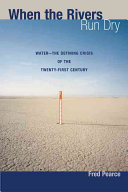

Most ebook files are in PDF format, so you can easily read them using various software such as Foxit Reader or directly on the Google Chrome browser.
Some ebook files are released by publishers in other formats such as .awz, .mobi, .epub, .fb2, etc. You may need to install specific software to read these formats on mobile/PC, such as Calibre.
Please read the tutorial at this link: https://ebookbell.com/faq
We offer FREE conversion to the popular formats you request; however, this may take some time. Therefore, right after payment, please email us, and we will try to provide the service as quickly as possible.
For some exceptional file formats or broken links (if any), please refrain from opening any disputes. Instead, email us first, and we will try to assist within a maximum of 6 hours.
EbookBell Team

5.0
40 reviewsThroughout history, rivers have been our foremost source of fresh water both for agriculture and for individual consumption, but now economists say that by 2025 water scarcity will cut global food production by more than the current U.S. grain harvest. In this groundbreaking book, veteran science correspondent Fred Pearce focuses on the dire state of the world's rivers to provide our most complete portrait yet of the growing world water crisis and its ramifications for us all.
Pearce traveled to more than thirty countries while researching When the Rivers Run Dry, examining the current state of crucial water sources like the Indus River in Pakistan, the Colorado River in the United States, and the Yellow and Yangzte rivers in China. Pearce deftly weaves together the complicated scientific, economic, and historic dimensions of the water crisis, showing us its complex origins-from waste to wrong-headed engineering projects to high-yield crop varieties that have saved developing countries from starvation but are now emptying their water reserves. He reveals the most daunting water issues we face today, among them the threat of flooding in China's Yellow River, where rising silt levels will prevent dykes from containing floodwaters; the impoverishment of Pakistan's Sindh, a once-fertile farming valley now destroyed by the 14 million tons of salt that the much-depleted Indus deposits annually on the land but cannot remove; the disappearing Colorado River, whose reservoirs were once the lifeblood of seven states but which could dry up as soon as 2007; and the poisoned springs of Palestine and the Jordan River, where Israeli control of the water supply has only fed conflict between Israelis and Palestinians.
The situation is dire, but not without remedy. Pearce argues that the solution to the growing worldwide water shortage is not more and bigger dams but greater efficiency and a new water ethic based on managing the water cycle for maximum social benefit rather than narrow self-interest.